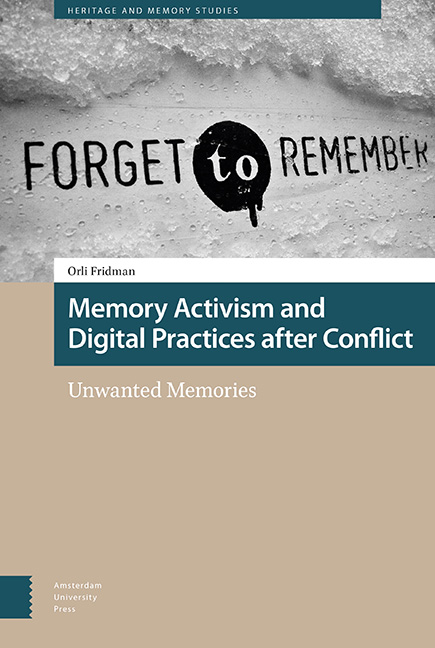Book contents
- Frontmatter
- Table of Contents
- List of Figures
- Preface
- Acknowledgements
- Introduction: Memory Activism and Alternative Commemorative Practices after Conflict
- 1 Unwanted Memories of (the Wars of) the 1990s
- 2 ‘Not in My Name’: From Anti-War to Memory Activism: The First Generation
- 3 ‘Too Young to Remember, Determined Never to Forget’: The Second Generation
- 4 Hashtag Memory Activism: Digital Memory Practices and Online Commemorations
- 5 Regions of Memory: The Post-Yugoslav Space as a Region of Memory Activism
- Epilogue: Unwanted Pasts in an Unresolved Present
- Appendices
- Bibliography
- Index
- Frontmatter
- Table of Contents
- List of Figures
- Preface
- Acknowledgements
- Introduction: Memory Activism and Alternative Commemorative Practices after Conflict
- 1 Unwanted Memories of (the Wars of) the 1990s
- 2 ‘Not in My Name’: From Anti-War to Memory Activism: The First Generation
- 3 ‘Too Young to Remember, Determined Never to Forget’: The Second Generation
- 4 Hashtag Memory Activism: Digital Memory Practices and Online Commemorations
- 5 Regions of Memory: The Post-Yugoslav Space as a Region of Memory Activism
- Epilogue: Unwanted Pasts in an Unresolved Present
- Appendices
- Bibliography
- Index
Summary
The ‘Arab House’ was one of the weekly meeting points for the youth movement I was a member of while growing up in Israel in the 1970s and 1980s. Deserted and derelict, it stood on the outskirts of our city where we entered the orange groves, one of many unnoticed structures that dotted our landscape; bare, desolate, or covered in graffiti. We saw through these objects, never engaging with their histories or pasts. I cannot recall ever bothering to wonder who named our meeting point the ‘Arab House’, or why that relic of a house was given that name. Did anyone ever live there? What was the history of the Arab House? We simply never asked. It would take me many more years to begin to engage with critical questions about the silence that surrounded ‘Arab Houses’ across the country, which were becoming more visible as I grew more politically aware. Those houses came to represent the Palestinian Nakba, and how it was concealed right there before our eyes, within Israeli landscapes and narratives.
Years later, in the mid-to-late 1990s, during coursework for my master's degree at Tel Aviv University, I was first introduced to what would become the field of memory studies. This forced me to ask difficult questions about ‘Arab Houses’, among other things. It was also then that I became acquainted with the notion of collective memory, which I have been drawn to ever since. I embarked on a small-scale research project to explore the claims and joint actions of descendants of the destroyed village of Ikrith, in the upper Galilee – where a promise was made by authorities in 1948 that its Palestinian residents would be allowed to return after the war, but that promise was never fulfilled. As the Ikrith activists and their families planned their action for the date that Israel celebrated its Day of Independence, this became my first experience with alternative commemoration as an act of civic protest.
So strong was my mnemonic upbringing and socialization at that time that taking part in alternative commemorative events generated a sense of profound uneasiness in me. Eventually and inevitably, though, my exposure to these actions led to a departure from the comfortable collective consensus of Israel's master commemorative narrative and rituals.
- Type
- Chapter
- Information
- Memory Activism and Digital Practices after ConflictUnwanted Memories, pp. 9 - 12Publisher: Amsterdam University PressPrint publication year: 2022



